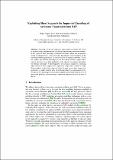Exploiting short supports for improved encoding of arbitrary constraints into SAT
View/
Date
2016Author
Grant ID
EP/H004092/1
EP/K015745/1
EP/M003728/1
UF1204070
Metadata
Show full item recordAbstract
Encoding to SAT and applying a highly efficient modern SAT solver is an increasingly popular method of solving finite-domain constraint problems. In this paper we study encodings of arbitrary constraints where unit propagation on the encoding provides strong reasoning. Specifically, unit propagation on the encoding simulates generalised arc consistency on the original constraint. To create compact and efficient encodings we use the concept of short support. Short support has been successfully applied to create efficient propagation algorithms for arbitrary constraints. A short support of a constraint is similar to a satisfying tuple however a short support is not required to assign every variable in scope. Some variables are left free to take any value. In some cases a short support representation is smaller than the table of satisfying tuples by an exponential factor. We present two encodings based on short supports and evaluate them on a set of benchmark problems, demonstrating a substantial improvement over the state of the art.
Citation
Akgün , Ö , Gent , I P , Jefferson , C A , Miguel , I J & Nightingale , P W 2016 , Exploiting short supports for improved encoding of arbitrary constraints into SAT . in M Rueher (ed.) , Principles and Practice of Constraint Programming : 22nd International Conference, CP 2016, Toulouse, France, September 5-9, 2016, Proceedings . Lecture Notes in Computer Science , vol. 9892 , Springer , pp. 3-12 , 22nd International Conference on Principles and Practice of Constraint Programming (CP 2016) , Toulouse , France , 5/09/16 . https://doi.org/10.1007/978-3-319-44953-1_1 conference
Publication
Principles and Practice of Constraint Programming
ISSN
0302-9743Type
Conference item
Collections
Items in the St Andrews Research Repository are protected by copyright, with all rights reserved, unless otherwise indicated.

